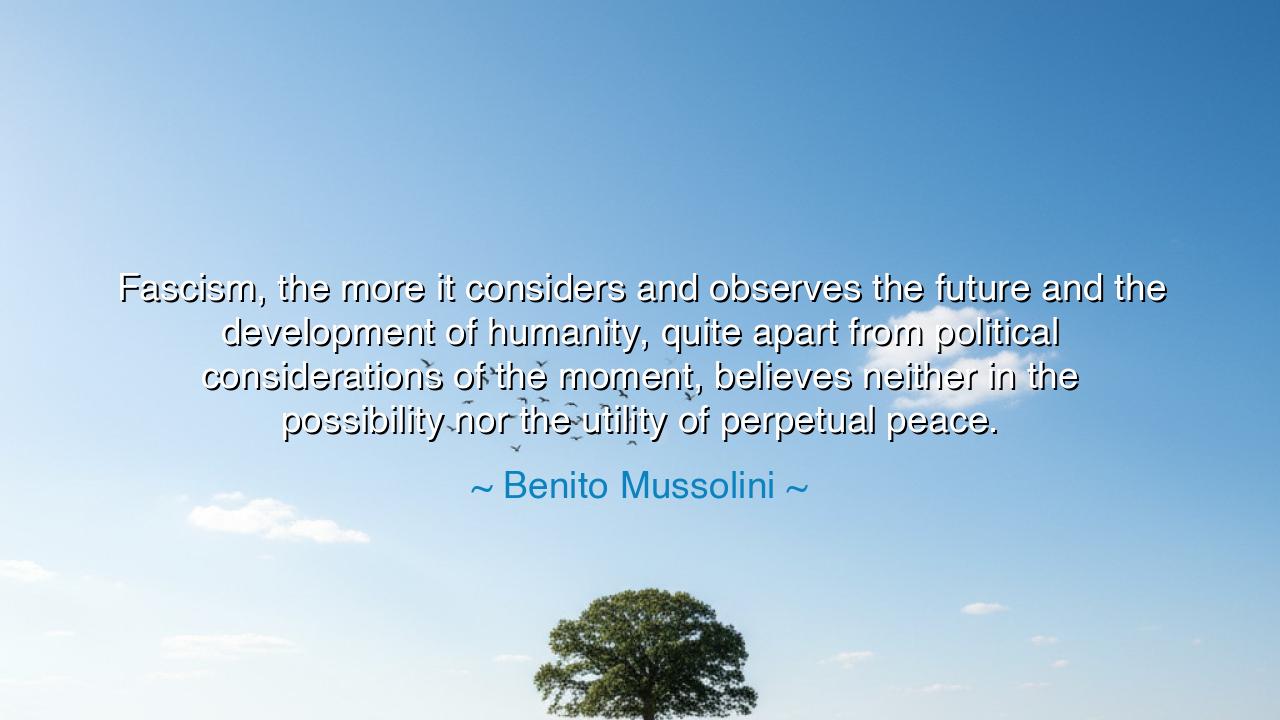
Fascism, the more it considers and observes the future and the
Fascism, the more it considers and observes the future and the development of humanity, quite apart from political considerations of the moment, believes neither in the possibility nor the utility of perpetual peace.






"Fascism, the more it considers and observes the future and the development of humanity, quite apart from political considerations of the moment, believes neither in the possibility nor the utility of perpetual peace." These words spoken by Benito Mussolini reveal the dark undercurrent of his ideology—one that rejects the notion of peace as an ultimate goal for humanity. In this statement, Mussolini emphasizes that, from the perspective of fascism, peace is not a desirable or even attainable state. Instead, he argues that conflict is intrinsic to the progression of societies and human development, suggesting that struggle is necessary for growth, a view that fundamentally opposes the more idealistic notion that peace is the natural and ultimate end for human civilization.
The ancient Greeks, ever engaged in the contemplation of human nature and society, understood that war and peace were not just political phenomena, but deeply woven into the fabric of existence. Heraclitus, the philosopher of change, famously said, “War is the father of all things.” His words reflected the view that conflict and struggle are essential to the natural order, driving the transformation of the world and the growth of human potential. In his view, without struggle, there would be no progress—a perspective echoed in Mussolini’s words, where the development of humanity is seen as inseparable from conflict. However, Heraclitus, unlike Mussolini, did not see war as a moral imperative but rather as a necessary force of nature that was woven into the very structure of reality.
Yet, the great philosophers of the ancient world also recognized the importance of peace as a counterbalance to the chaos of war. Socrates, for instance, argued that the true purpose of society should be the pursuit of virtue, which could not be fully realized in a state of continuous conflict. His philosophy was centered on reason and dialogue, aiming to foster a society where individuals could live in harmony, cultivating wisdom, justice, and equality. In contrast to Mussolini’s view, Socrates would have argued that peace, when achieved through the alignment of minds and virtues, is not only possible but essential for the flourishing of humanity. The ancient Greeks understood that while struggle is a part of life, it should not be the end goal, and that peace was the ideal state where human potential could be fully realized.
Mussolini’s statement, however, calls for the valorization of struggle, conflict, and even violence as integral to the future and evolution of societies. This is a dangerous belief, for it justifies war and aggression under the guise of progress. History provides many examples where the belief in perpetual conflict led to devastating consequences. Consider the reign of Napoleon Bonaparte, who believed in the necessity of conflict to achieve his vision of a unified Europe. While his empire was built on military conquest, it was also his undoing, as the wars he waged caused unprecedented destruction, leading to the loss of millions of lives and the eventual downfall of his empire. Napoleon’s rise and fall serve as a testament to the perils of believing that conflict is the path to progress.
In the modern world, Mussolini’s words resonate as a reminder of the dangers of ideologies that embrace war as a means of achieving social, political, or economic goals. Fascism, in particular, with its rejection of peace as a noble goal, advocates for dominance and submission rather than cooperation and mutual understanding. The world has seen the consequences of such ideologies, most notably in World War II, when fascist regimes led to the devastation of entire nations, the genocide of millions, and the destruction of what could have been a more peaceful future for humanity. Mussolini’s embrace of violence and struggle not only scarred the world in his time but continues to serve as a warning about the dangers of glorifying conflict.
The lesson that emerges from Mussolini’s words is not just a cautionary tale about fascism, but a broader reflection on the role of conflict in human history. While it is true that struggle has shaped the course of civilizations, the ultimate goal of humanity should not be to perpetuate conflict but to find solutions that foster peace, cooperation, and mutual growth. The idea of perpetual peace, as Kant and other philosophers have argued, is not only possible but essential for the advancement of humanity. Peace should not be viewed as a weakness or as an end to human potential, but as a necessary foundation for true progress, one that enables individuals and societies to flourish without the destruction and devastation that conflict brings.
Therefore, let us learn from history and from the wisdom of the ancients. While conflict may be inevitable, it should never be celebrated as a means to an end. The true strength of humanity lies in our ability to embrace peace—not as a passive surrender, but as an active force for cooperation and growth. As we move forward into the future, let us focus on building societies where peace is the goal, and where wisdom, reason, and justice lead the way. Let us recognize that it is in our shared humanity, in our ability to come together, that we find the greatest potential for progress, not in the endless cycle of conflict and struggle.






AAdministratorAdministrator
Welcome, honored guests. Please leave a comment, we will respond soon